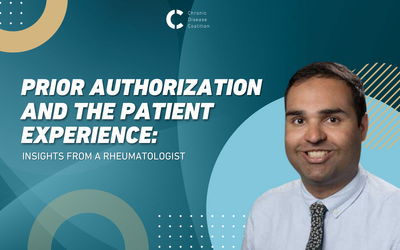
We recently recorded a Spoonful video with Dr. Amish Dave, MD, a board-certified rheumatologist at Virginia Mason Medical Center in Seattle, Washington. He treats common conditions such as musculoskeletal concerns and sports injuries, as well as autoimmune diseases such as rheumatoid arthritis, lupus, psoriatic arthritis and vasculitis. He is active with several organizations, including the Washington State Medical Association, to advocate for improvements to the healthcare system.
If you or someone you know is currently managing the challenges of prior authorization, this episode is a must-listen.
Dr. Dave offers practical advice for patients and doctors alike, emphasizing the importance of patience and communication with healthcare providers.
Prior authorization requirements can delay access to needed medications and requires additional time be spent on paperwork, review and appeal, as the Spoonful video explores. Dr. Dave must often explain to his patients why they cannot immediately get the medication he prescribed for them, even if it’s commonly given for their disease. For rare conditions or off-label medication use, the process can be even slower and more complicated.
"So what I tell them is that prior authorization essentially is a process that's been set up by insurance companies to look at the medication that has been prescribed by a clinician and to determine whether, quote, it's ‘appropriate’ for them or not."
This can result in long delays and additional paperwork for patients, their providers and administrative staff.
The risks to patients are real: For patients with autoimmune diseases, such as rheumatology or gastroenterology conditions, delays in medication approval can lead to persistent inflammation and long-term damage to organ systems. In rheumatology, for example, delays can result in permanent joint damage that cannot be reversed. Similarly, delays in medication approval for neurological conditions can have serious consequences for the brain and nervous system.
"It makes my hair fall out every day,” Dr. Dave said. "The delays are almost always on the insurance side and they have a financial interest in slowing down approval for medications.... The insurance companies are racking up huge profits, as are the pharmacy benefit managers that are providing these medications to patients."
What we can do
He shared some valuable insights on how patients and providers can work together to improve the prior authorization process. Here are three key takeaways:
1️⃣ Building Partnerships
One of the major themes that emerged from our conversation was the importance of partnerships between healthcare providers and patients. Working together, providers and patients can work with the insurance company to push the process and get treatment approved. Dr. Dave also pointed out that patients can and should connect with the billing experts in the provider’s office, who are often the ones dealing with the insurers.
2️⃣ Advocacy Matters
Patients need to speak up about the barriers they face and share their stories with legislators. It's crucial for legislators to understand the challenges patients encounter on a daily basis, and by raising their voices, patients can create awareness and drive change.
3️⃣ State-Level Engagement
There is a lot of variation in healthcare policies and advocacy efforts across different states. While some states are more proactive in addressing these issues, others may have fewer resources. Patients should connect with advocacy organizations and networks specific to their disease in order to find support and resources. Building long-term relationships with local legislators is crucial for this and so many other issues.
State insurance commissioners may also have a role to play in oversight and enforcement.
Conclusion
Delays in medication approval can have serious consequences for patients' health outcomes, and insurance companies have a financial incentive to prolong the process. Advocating for insurance policy changes is crucial to ensure timely access to necessary medications. By working together and advocating for change, patients and healthcare providers can help improve the prior authorization process and ensure that patients receive the medications they need in a timely manner.
A few additional recommendations from Dr. Dave:
- An American Sickness, by Elizabeth Rosenthal provides valuable insights into the history of insurances, pharmacy benefit managers, and the overall healthcare landscape.
- The Coalition of State Rheumatology Organizations has a great legislative tracker for issues such as prior authorization, as well as resources on how to file a complaint
- Other organizations who are active on this issue include the Lupus Foundation, the National Psoriasis Foundation, and the Arthritis Foundation—also all active Chronic Disease Coalition partners.